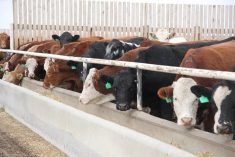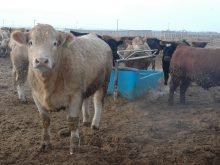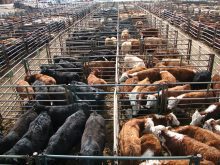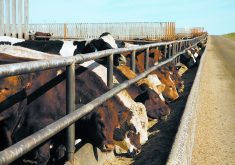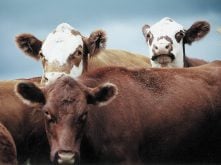This cattle market information is selected from the weekly report from Canfax, a division of the Canadian Cattlemen’s Association. More market information, analysis and statistics are available by becoming a Canfax subscriber by calling 403-275-5110 or at www.canfax.ca.
Fed cattle under pressure
Extreme volatility in the Chicago cattle futures market and weak demand kept the pressure on fed cattle prices.
Cash trade volume in Canada was too small to generate a trend.
Packer rail grade bids from $250-$270 per hundredweight delivered were reported with incentives to defer delivery.
Read Also

Government support for Canadian farmers has plummeted
Subsidies in Canada were 30 per cent of gross farm receipts in 1980s and are now around eight per cent
Most feedlot managers wrote the week off and planned to shuffle large cattle into contracts.
The supply of market-ready animals is typically tighter in December and January, but packers are deferring delivery to winter. Also, the mild fall has led to excellent feeding condition, which means cattle that normally would be ready for market in February might show up in January.
In the United States, packers bid US$126-$127 per cwt. for cash cattle in Kansas and $122-$123 in Nebraska against sellers asking more than $131, feedlot sources said.
Plains cattle had fetched $126-$129 per cwt. the previous week.
The Canadian cash-to-Chicago futures basis was estimated at a seasonally weak -$14.54.
Weekly western Canadian slaughter to Nov. 14 rose 13 percent to 34,482.
Weekly exports to Nov. 7 were steady at 4,192 head.
Cattle futures, cutouts and fed prices are all testing bottom and a break higher for any one could turn the market higher.
Cows sharply lower
D1, D2 cows ranged $100-$118 to average $108.42, down $6.75 and the lowest price since June 2014.
D3 cows ranged $85-$105 to average $94.21.
Rail grade cows ranged $201-$206.
D1, D2 cows fell 28 percent from spring highs to fall lows, which was the largest decline in the past five years.
Feeder cows averaged $111 last week with trade to $130 per cwt.
There is talk that more cows are going onto feed this year than last year.
This could increase the number of market ready animals early next year.
Weekly non-fed exports totalled 7,594 head, the third largest volume this year.
Feeders fall
Western Canadian calf and feeder indices fell about $11 and were trading at the lowest levels this year.
Volatile cattle futures had a significant impact on the day to day pricing of cattle.
June live cattle experienced triple digit moves in 10 of the 12 previous trading sessions.
A 100 point move on the futures market can influence calf prices by as much as $3.50 per cwt, assuming a steady Canadian dollar.
Auction volumes are rising seasonally and more contract cattle are being delivered, but truck availability is not an issue as it was last year, partly because of better weather and also because few cattle are being exported to the U.S.
Weekly exports to Nov. 7 were only 2,912, compared to 17,265 last year.
In electronic sales, 875 lb. steers for February and March delivery were passed at $214-$214.50 per cwt.
Canfax said steer calves placed in feedlots in mid-November and sold as market ready cattle in July would need a price of $179 to break even.
Western Canadian interest remains good, but eastern Canadian buyers appear to have backed off the western market.
A large percentage of Saskatchewan calves and yearlings appear to be going to Alberta.
U.S cattle on feed
The number of cattle placed into U.S. feedlots in October fell four percent from a year ago to the lowest level for October since the U.S. began tabulating the data in 1996.
However, this was expected and it was not expected to influence futures.
The feedlot cattle supply on Nov. 1 was 10.794 million head, up two percent from a year ago.
Turkey trumps beef
U.S. boxed beef values fell last week as retailers featured turkey for American Thanksgiving, with Choice down $6.97 to $204.83 and Select falling $7.14 to $193.34.
Canadian cut-out values for the week ending Nov. 6 were mixed with AAA up C$1.74 at $275.11 and AA down 87 cents at $263.52.
Montreal wholesale prices fell to $311-$314 per cwt.
The Canadian Consumer Price Index for October for beef was up 1.5 percent from September, while pork was up .6 percent and poultry was down .5 percent.
Beef was up 12.8 percent from last year, while pork was up 2.3 percent and poultry was up 3.3 percent.


